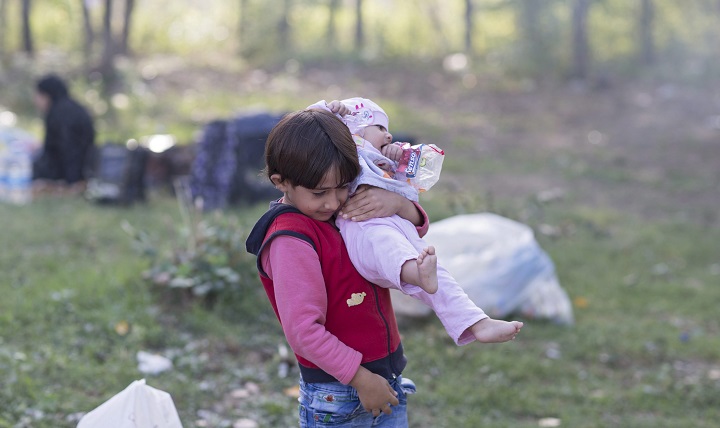TORONTO – The Conservative party’s about-face on the Syrian refugee crisis may not be enough to ease the minds of Christian voters disenchanted with the government’s erstwhile reluctance to make Canada more welcoming to people in need.

Prime Minister Stephen Harper’s oft-repeated pledge to allow 10,000 refugees into the country over four years did not always sit right with voters stereotypically believed to be at the core of his support base.
Saturday’s announcement that regulations would be relaxed in a bid to allow thousands of refugees into Canada by the end of the year appeared to do little to ease their concerns.
Ryan Dueck, pastor of a Mennonite church in Lethbridge, Alta., believes many will feel the gesture offers too little too late. He noted that Immigration Minister Chris Alexander continued to place security concerns ahead of humanitarian ones, prompting him to view the mid-campaign pledge with a degree of skepticism.
“Nobody’s saying that we just uncritically fling the doors open, at least not to my knowledge, (but) I wonder if his articulation of this as a ‘top priority’ might prove to be a way of giving the Conservative government a bit of room to manoeuvre once the election campaign has come and gone,” Dueck said.
“I don’t know this for sure, of course. I’m just thinking that given the party’s history of prioritizing security and using this as a reason for not moving more quickly, I wouldn’t be shocked to see ‘prioritizing’ of security show up down the road as a reason for why the refugee situation hasn’t improved as quickly as Canadians hoped it might.”
READ MORE: Federal government eases rules on Syrian refugee claims
The promise also runs the risk of alienating hard-liners who may see the policy shift as yielding to election-related pressure from the left, he added.
Whatever the outcome, observers of the faith believe the Syrian refugee crisis may challenge the widely held public perception that devout Canadians represent a nucleus of support for the Conservative party.
Christians of many denominations are aware of a public stereotype equating belief in the Bible with support for right-wing governments, but argue such thinking fails to account for the many nuances in the teachings they espouse.
For those who believed refugees were getting short shrift before, the party’s comparatively guarded position stands in stark contrast to a core tenet of their faith.
“We’re meant to reach out to the people around us,” said Rebecca Blaevoet, an Orthodox Christian living in Windsor, Ont.
“(Christ) doesn’t say, ‘clothe the naked as long as he’s a member of your particular faith community’ – he just says ‘do it.”‘
Blaevoet said Christianity has a long tradition of extending help to populations in need, citing the Vietnamese “boat people” of the 1970s and Christians persecuted during the recent war between Russia and Ukraine as relatively recent examples.
READ MORE: Reality Check: Are refugees an economic burden?
While Blaevoet’s own church is not actively involved in mobilizing help for refugees fleeing the war-torn Middle East, the issue has gained considerable traction in faith communities across the country.
Karen Hamilton, general secretary with the Canadian Council of Churches, said parishes were galvanized to ramp up support for refugees after seeing the heartbreaking photo of a three-year-old Syrian toddler lying dead on the Turkish beach where his body had washed ashore.
She now believes that there is “no issue more compelling” for the country’s faith communities.
Prominent religious leaders, including Pope Francis, have issued calls to action for religious communities to do their part to relocate people seen as among the most vulnerable in the world. She said Saturday’s announcement was a positive development, but added that religious groups “look forward to the implementation.”
Two of Canada’s political parties are trumpeting similar messages. NDP Leader Tom Mulcair has promised to resettle 10,000 Syrian refugees by the end of this year and another 9,000 annually for the next four years, while Liberal Leader Justin Trudeau has vowed to bring in 25,000 Syrians by the end of the year.
READ MORE: Justin Trudeau says he would consider airlifting refugees from Syria
Harper originally promised only to allow 20,000 refugees into the country over the next four years.
Long-time Catholic Bob McKeon of Edmonton said that approach gave people concerns that have not been alleviated by the weekend announcement.
“The immediacy and need is there. . . . What’s the reluctance? Even with this, the numbers haven’t increased,” McKeon said, adding that the current focus on Syrian refugees may displace people in equally dire straits from other parts of the world.
McKeon said many congregations have mobilized support, raised funds and are ready to start actively helping refugees.
Dueck, meantime, said he believes individual concerns ought to have more sway than partisan loyalty.
READ MORE: The European migrant crisis is only getting worse. Here’s what you need to know
He said the diverse political views represented in his congregation cannot be captured by any single party platform, adding Conservatives are not the only major party to appeal to Christian sensibilities.
The question of refugees has become a hot-button topic in his community and garnered responses ranging from the welcoming to the xenophobic, he added.
Bigotry has no place in Christian discourse, he said, citing Jesus Christ’s exhortation to love and pray for everyone, including people who could be perceived as enemies.
Christians are obligated to be guided by this message, Dueck added, saying such teachings ought to make it easy to take a position on the Syrian refugee crisis.
“People have to wrestle with it,” Dueck said. “You have to step back and say: ‘OK, well, I think Jesus might be more of a priority than Stephen Harper or Thomas Mulcair or whatever.”‘



Comments